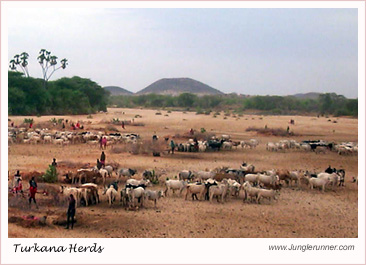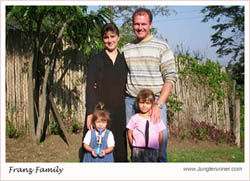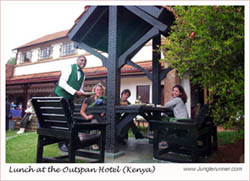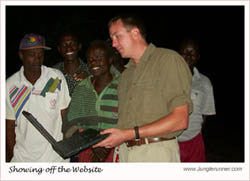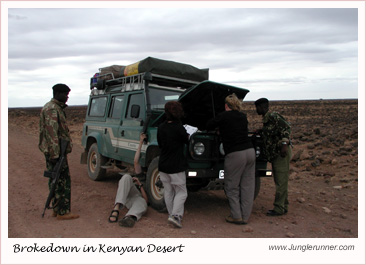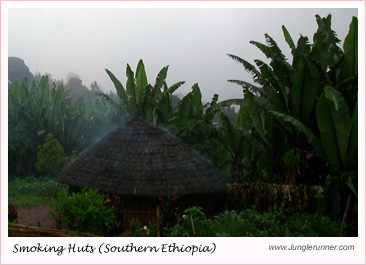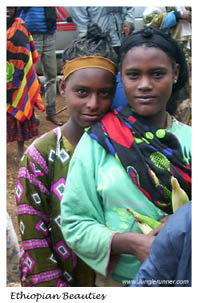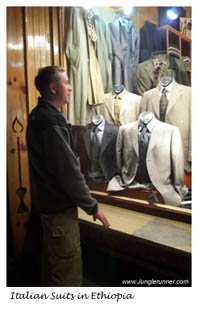
. . . LAND ROVER OVERLAND EXPEDITION
|
#7 - Bandit Country (Addis Ababa, ETHIOPIA) � Do you remember the pictures of starving Ethiopian children on TV in the 80�s, skeletal refugees staring blankly at the camera, collapsed on the dusty ground? Ethiopia isn�t making the disaster news these days, but still in the back of my mind I expected to see gaunt cattle and stick huts. The landscape we passed through in northern Kenya confirmed the expectation, a barren volcanic desert of rocks and sand. Nomadic Turkana tribesmen watched over small cattle herds, finding meager nourishment from dry riverbeds. So I was quite surprised when we crossed into Ethiopia. But first to the beginning of the story... The long drive north from Nairobi proved to be the latest in a series of Land Rover infamies. After an overnight stay with an old friend in Nakuru (and a six hour wait to see a specialist for a mysterious bite that had swollen Jody's arm alarmingly) we headed north. Lunch at the Outspan Hotel in Nyeri was a bit of civilization before diving into the desert. We stopped at the last major gas station in the country, filling the main tank, auxiliary tank, and roof-mounted jerry cans to max out our 2,000km range.
We camped at the military post, a collection of tin huts guarding a small village of cattle herders. There were so many cockroaches in the long-drop outhouse that the women insisted on going in pairs - one armed with flashlight and bug spray to do battle while the other took care of business. Our digital cameras have been great amusement on the road. People always want to have their picture taken, but when they can see the picture on the camera screen afterward they start shouting and yelling, and a crowd forms in no time and the posing begins. We are seldom able to get away without taking dozens of pictures and showing them off. I explained to the soldiers what we were doing, writing stories and posting them to the internet. "You see this website on my laptop? In a few days, your picture will be here!" The truck had held up well on the rough gravel road. With only 450km to the border I even joked about clearing customs by noon. It was not to be. An hour into the drive, while taking photos of the Turkana herds, we were accosted by one of the warriors. The nomadic tribes are considered the 'red-necks' of Kenya, concerned only with their cattle, alcohol, and fightin'. Normally after taking photos you will be pestered for cash. This can be solved with smiles, waves, and firmly driving off. However, in this instance the herder was toting an AK-47, didn't know Swahili, and seemed particularly focused on getting money. We tried charm and a few pens but he kept a stubborn grip on Sally's arm in the front seat. Finally seeing the entire box of pens he grabbed at them, it was our chance, and we accelerated out of there. Marsabit is the last decent sized town in Kenya and we arrived around 11am. Rounding a final corner into town I slowed for a herd of cows crossing to the left. Inexplicably, on seeing the truck the herder whacked the herd back to the right - already committed, I watched seemingly in slow motion as we slid on the gravel (feathering the brake to maintain some steering) into the middle of the herd. One tan cow looked up incredulously as the truck bore down. As Sally describes it, first there was a head in the windscreen, then four hooves. The cow got up, looking unhurt by the tumble - I think most of the damage was to my pride. We were required to go to the District Commissioner's office in Marsabit, and in the office of the colonel responsible for security, were informed that space or no space we had to take two escorts with us for the final 220km. So all three women squeezed into the back with Michael, while Joseph sat up front - his machine gun at the ready.
Happy to have escaped disaster in the desert, I groaned when the rear suspension suddenly went loose. A flat tire I figured. Not so. The tires were in fine shape, but peering behind them I spotted the problem - the right rear shock had literally exploded. It was hanging in two pieces. We nursed the truck into the next town and swapped out "the world's best shock absorber" for one of the generic spares. And finally, things went our way. The road turned nice again, Michael and Joseph helped us find a good campsite in Moyale (the border town), we pitched camp and finally relaxed with some camp cooked pasta and fine grind coffee. Ethiopia
Tourism has not yet returned to Ethiopia and this has plusses and minuses. There are none of the internet cafes or touristy restaurants that make life easy on the road. But this forces you to search out local restaurants and go through the awkward pantomime of relieving yourself to find a bathroom. Embarrassing sometimes, and definitely time consuming, but rewarding in the end because you have real contact with the people. For lunch we stopped at a small town bisected by a military checkpoint. The truck was an immediate source of interest. "Where can we find lunch. Food." mime hand to mouth. A man pointed to a series of three derelict straw huts.
Coffee originated in Ethiopia and has been brewed here for thousands of years. The only place I could find was a straw roofed awning with some benches and a few battered thermoses of coffee. No matter, after going through the trouble to find the place, having been led by a couple of locals who understood my gestures, I figured it was only polite to buy a cup. A small glass tumbler was produced and a stream of hot black liquid sloshed inside. Sugar? Yes. I tasted. Wow - strong, not bitter, an absolutely perfect double espresso. Locals crowded into the shack trying out their bits of English. At $0.06 per glass I could afford to buy a couple of rounds. Sally, Gulin, and Jody managed to find me and we all gave our digital cameras a workout.
We'll be stuck here for about a week wrangling visas and vehicle permission for Sudan - in fact there's a question whether Jody (US citizen) will be allowed in at all. But in a city with great food, great coffee, and friendly faces, it will be an easy rest.
|
All rights reserved
